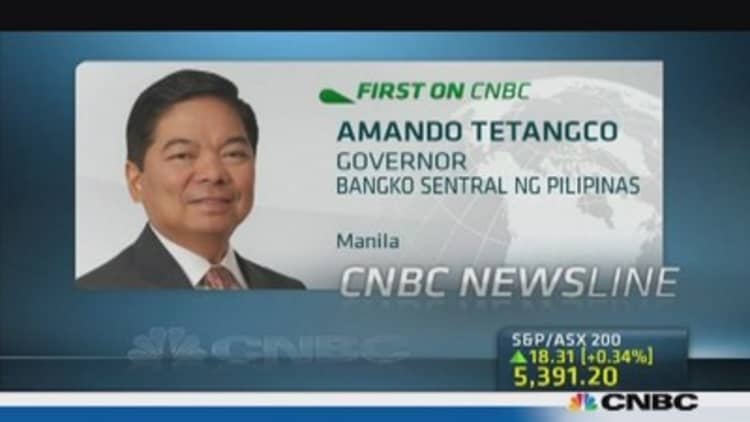
The Philippines' economic "sweet spot" may offer protection from the next wave of concerns over when the U.S. Federal Reserve will begin to taper its asset purchases.
Emerging markets have stabilized after a bout of volatility over the May-to-September period as fund outflows on concerns the Fed would begin to taper its $85 billion-a-month asset-purchase program have reversed. After the Fed surprised markets with its decision not to begin tapering at its September meeting, many analysts pushed their tapering expectations back to early 2014.
While the tapering concerns hit countries needing to finance current account deficits the hardest, the Philippines has been running a current account surplus.
(Read more: In Asia ratings game, guess who just jumped ahead?)
"Even if there's an outflow of capital, the balance of payments would still be expected to show a positive balance," Amando Tetangco, governor of the Philippines' central bank, Bangko Sentral ng Pilipinas (BSP), told CNBC.
In addition, "the external debt of the country has been manageable," he said. "Our gross international reserves, which are now the equivalent of about one year worth of imports of goods and services, are higher than our external debt. The external debt is just about a fifth of gross domestic product," he said.
He noted the country also has a strong macroeconomic position.
(Read more: Emerging market reprieve is only temporary: Pimco)
"There have been structural changes in the economy. For instance, we estimate that the potential output growth has gone up to between 6-8 percent from the previous 4-5 percent. That means the economy can expand faster than what we saw in the past without necessarily leading to overheating," he said.
The central bank Thursday kept its policy rate unchanged at a record low of 3.5 percent for an eighth consecutive meeting, even though the country's economy has grown at an around 7 percent rate over the past 12 months, as it expects inflation to hover around 3 percent, the low end of its 3-5 percent target.
(Read more: Late Fed taper may do more harm than good for emerging nations)
"Benign inflation alongside resilient economic growth leaves BSP in a 'sweet spot,'" Mizuho Bank said in a note, adding "robust remittances act as a growth buffer by supporting consumption and increasingly, investment activity (by households) as well."

Others also say the country is in "sweet spot." Remittances are being bolstered by better economic conditions in host countries, rising more than expected in August and supporting domestic consumption, noted Trinh Nguyen, an economist at HSBC, in a note. She also expects the increase in exports to continue.
In August, exports climbed 20.2 percent from a year earlier after adding 2.3 percent in July, although exports for January-August were down around 0.8 percent.
(Watch now: Southeast Asia's enterprise economy)
Barclays expects the Philippine currency to continue outperforming its peers. "We expect further currency appreciation given the Philippines' strong fundamentals and relatively low vulnerabilities. Strong growth, low inflation, supportive balance of payments, large foreign-exchange reserves, and low levels of external debt provide a constructive fundamental backdrop for the peso.
The peso is also likely to see additional support from the seasonal rise in remittances ahead of year-end," the bank said in a note.
But the archipelago may not be completely immune to tapering. "The Philippines (like most emerging market countries) is vulnerable to large outflows of capital during periods of global risk aversion despite improved macro and credit fundamentals," Mizuho noted.
(Watch now: Emerging Asia to benefit from shutdown: Pro)
Capital Economics also is concerned that continued low rates will fuel asset bubbles, especially in the property sector. "The stock market also looks overvalued relative to its historical valuations," it said in a note.
The Philippines' stock market is trading at 18.6 times its consensus 12-month forward earnings forecast, a nearly 30 percent premium to its long-term average, according to data from Nomura.
— By CNBC's Leslie Shaffer. Follow her on Twitter: @LeslieShaffer1

